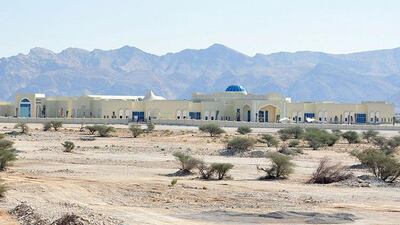Foreign Correspondent
MUSCAT // Drug addiction in Oman is on the rise, prompting the government to invest more than $200 million in the next five years, to double the number of beds in the country’s only rehabilitation centre and build more facilities.
The government is digging into its financial reserves to expand the existing drug rehab centre at Al Masarra Hospital from 100 beds to 200 beds this year. It is also planning to build three more facilities in different parts of the country – Sohar, Sur and Salalah – in the next five years with a budget of US$230m (Dh844m).
The three additional facilities are scheduled to be built by 2022, bringing the number of beds countrywide up to more than 1,000.
Before 2014, the average age of drug addiction in Oman was 35 but that figure has since dropped to below 20, a spokesperson at the National Narcotics and Psychotropic Centre told The National, adding that increasing numbers of people were becoming addicted to drugs every year.
From 2010 to the end of 2016, the number of drug addicts in Oman more than tripled from 2,000 to 6,500, according to the ministry of health. But volunteers in charity organisations say the actual number of addicts is much higher than stated in the official records.
“Parents would not admit that their children are addicted or wives that their husbands are abusing drugs on a regular basis. They come to us for counselling and when we tell them to register them to Al Masarra Hospital, they refuse,” said Khadija Al Hooti, a therapist and volunteer with Al Sakeena Charity Organisation.
“It is the stigma thing that they try to avoid. They don’t want their families to be associated with drug addiction. So the actual number of addicted people could be as high as 30,000.”
Al Masarra Hospital is the only medical institution in the country that offers rehabilitation for drug addiction. When the hospital opened in Muscat in 2014, the drug rehab centre had just 50 beds. It doubled its capacity a year later, adding another 50 beds.
Ali Al Khusaibi, 34, is one of the rare cases of a reformed drug addict. He now visits schools and universities to talk about his previous addiction and to spread the “say no to drugs” message to students, but even he would not want to cross the line of exposing his family.
"I am from a town which is 400km away from Muscat and nobody knows about my family here. This is the reason why I freely talk about my experience so my parents, my wife and children don't get exposed to what I did," Mr Al Khusaibi, who owns a small business in his hometown, told The National.
“In our tradition, you bring a shame to your family if you use drugs or admit that you have been using drugs. I know it (the stigma) is something that needs to change,” he said.
In 2014, the Royal Oman Police announced it would not prosecute drug users or reveal their names, in a bid to encourage Omanis to report addiction of their family members so they could get rehabilitated.
“Even with that supportive announcement, Omanis are still reluctant to report their addicted family members to the police or straight to the hospital so they could get help,” Mr Al Khusaibi added.
Teachers also noted that teenagers are getting hooked on drugs now more than ever before, and they urge for a unified effort to combat the rising menace.
“Students as young as 15 have become the target of drug peddlers. The school has called the police twice in the last three years when we spotted peddlers in our campus trying to sell milk or even juice mixed with heroin,” said a teacher at one of the schools in Muscat, who did not want to be identified.
“I understand it is as cheap as 500 baiza (Dh4.70) and also very mild in the content of drugs. This is how they start off and later get hooked with the stronger stuff.”
Officials say that alcoholism is also on the rise.
“In 2012, there were over 4,500 people registered in Omani hospitals with alcohol-related diseases. By end of 2016, the figure reached close to 11,000. Their treatment is costing the government a lot of money,” a spokesman at the ministry of health said.
As with drug addiction, Al Masarra Hospital is currently the only medical institution in Oman providing treatment for alcoholism. But state-owned company Petroleum Development Oman is in the process of building a $35m centre dedicated to treating alcoholics to help meet the growing need. The centre, which will be located next to Al Masarra, is scheduled to be completed by the end of this year.
foreign.desk@thenational.ae

